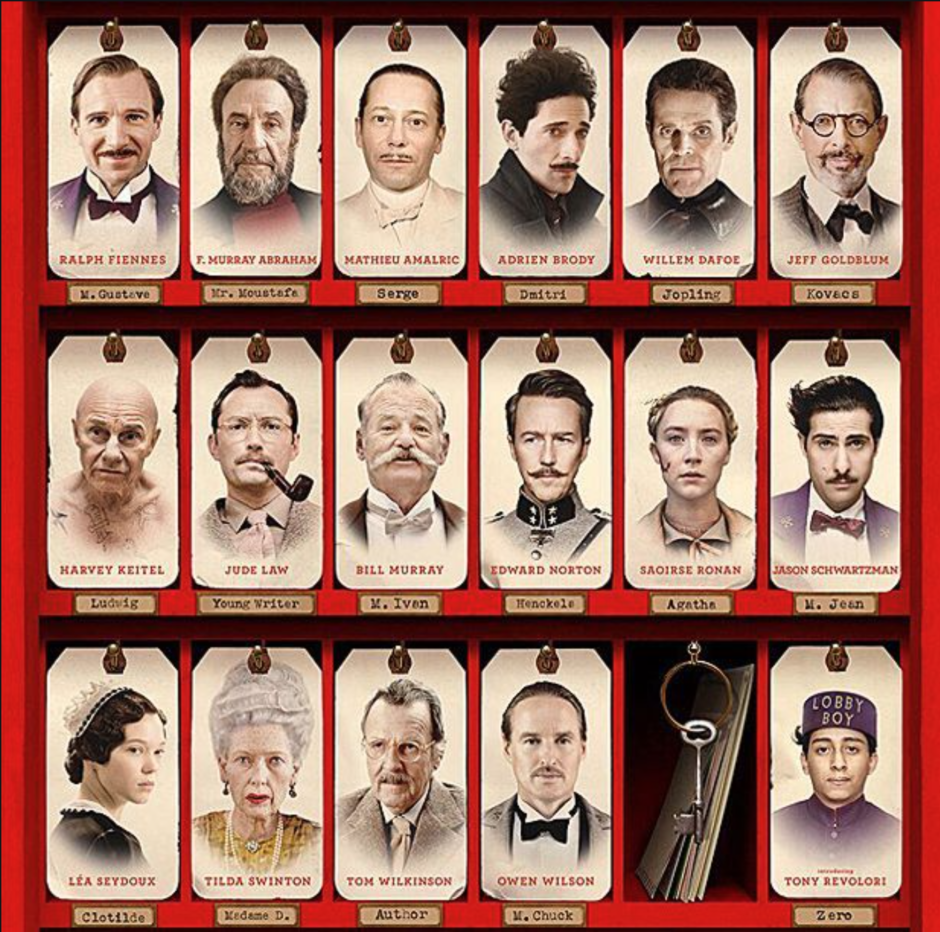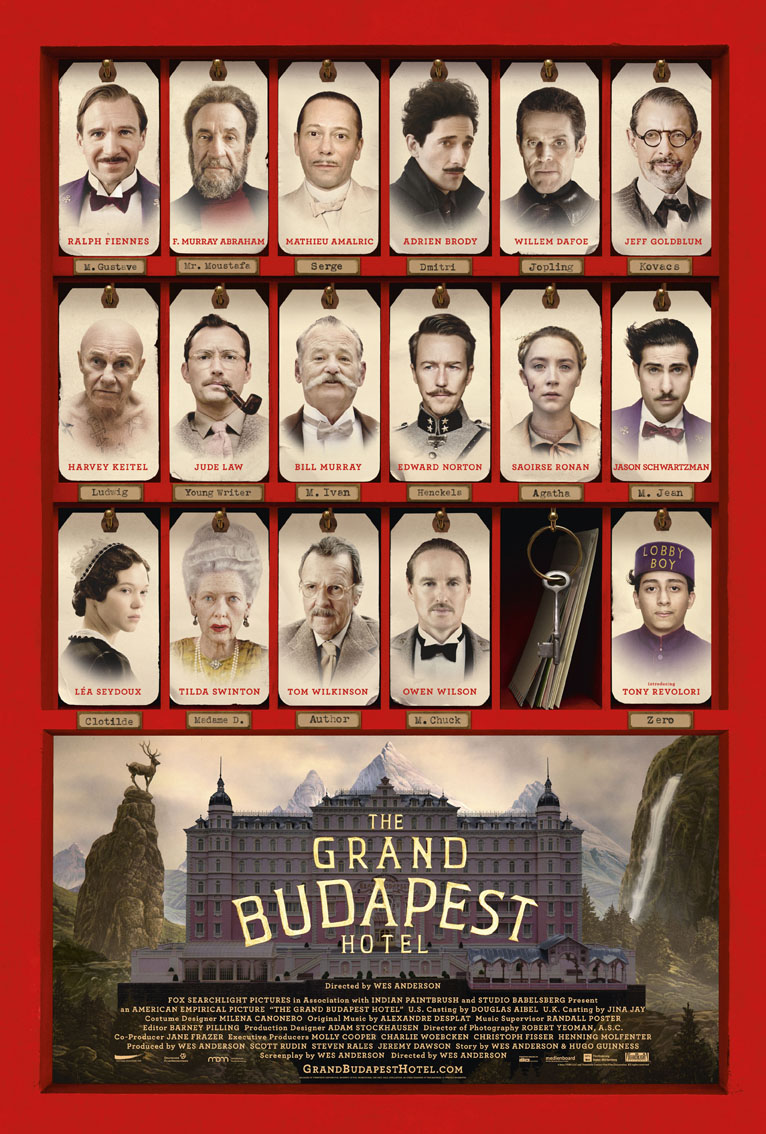EDWARD NORTON: THE GRAND BUDAPEST HOTEL INTERVIEW
Oscar nominated actor Edward Norton joined an all-star ensemble cast for Wes Anderson’s The Grand Budapest Hotel, which won the Grand Jury Prize at the Berlin Film Festival. Norton, a fan of Anderson’s work since he saw the director’s feature film debut, Bottle Rocket, plays Henckels, the captain of the Lutz military police in Anderson’s vividly imagined, fictitious European country of Zubrowka.
Set in the 1930s as war looms on the horizon, The Grand Budapest Hotel recounts the adventures of Gustave H., a legendary concierge at a famous European hotel, and Zero Moustafa, a lobby boy who becomes his most trusted friend. The story involves the theft and recovery of a priceless Renaissance painting, a raging battle for an enormous family fortune and the sweetest confection of a love affair—all against the backdrop of a suddenly and dramatically changing Continent.
Norton joined an extraordinary cast of A list stars on the project, including F. Murray Abraham, Mathieu Amalric, Adrien Brody, Willem Dafoe, Jeff Goldblum, Jude Law, Bill Murray, Saoirse Ronan, Jason Schwartzman, Tilda Swinton, Tom Wilkinson and Owen Wilson.
Norton has earned a reputation as one of the very best actors of his generation. His breakout role in the courtroom drama Primal Fear, in 1966, won him an Academy Award nomination for Best Supporting Actor.
Born and raised near Baltimore, he graduated from Yale University before embarking on a stellar career as an actor, producer and director. As an actor his CV includes Everyone Says I Love You, Fight Club, The Score, 25th Hour, Kingdom of Heaven, The Illusionist, The Painted Veil, The Incredible Hulk, Stone, The Bourne Legacy and Anderson’s previous film, Moonrise Kingdom.
Norton received second Academy Award nomination, for Best Actor, for his searing performance in American History X.
Did you guys decide to work together again on Moonrise Kingdom?
Yeah. Wes and I had sort of exchanged mutual appreciation a long time ago. He saw me in a play and sent me a really nice letter, and I had written him about some of his films. I think I wrote him a letter about Rushmore, when it came out. We both live in New York. I think we both had this notion that maybe it would be great to do something, but I never pressed on it, just because it has to come from Wes. He has such a specific set of visions and I think you have to fit within it. Now that we’ve worked together we really enjoyed it. Also, I think Wes likes to work with people and if he feels that you’re at home within the repertory company feeling of what he does, that gives him a good conviction. I think he needs people who have faith in that, and in him, and then, in some sense, you can be part of the company. We were still barely putting Moonrise Kingdom out at Cannes. He and I and some friends took a little trip right after it, and he already had the Grand Budapest script then. That was in 2011.
What did you make of it when you first read it?
I thought it was great. I thought that Gustave was one of the best characters he has ever written. When you’re reading the script, I had the feeling that Gustave was an almost instantaneously classical, classic character. I was laughing so hard reading him. His worldview is so funny and so memorable, and all of his righteous indignation. That was my first reaction – that Gustave was one of the best characters that Wes had ever created. And he told me he had had Ralph [Fiennes] in mind, not that he was asking my opinion. I said, ‘I literally cannot think of anybody better.’ I said, ‘If you’d told me anybody else, I’d bang down your door to say I want to play that part.’ But it was so well suited to everything that’s great about Ralph. I just thought it was so funny and touching, as Wes’s stuff often is: there’s a lot of humour, but then there’s poignancy under it. It reminded me of Max Fischer (from Rushmore) or Steve Zissou, these characters who are pressing back against change, yes, but also for an aesthetic vision of the world. Max Fischer’s not fighting change, he’s determinedly fighting against being pigeonholed. He’s fighting for the renaissance view of the world, and for a sense of himself as an adult. I think that he and Steve Zissou and Gustave are all, in some way, at war with the philistines. They are all kind of righteous.
Do you think that is the common thread throughout with films?
Yeah. In a more general sense – not just on characters – I’ve come to think that Wes’s films are all about the way that your real family disappoints you and so you create the family that you need.
Like the frequent appearance of orphans?
Yes, or the characteristics of someone like Gustave. You know very little about him, but you realise nothing that came before matters. He’s created the world and populated it with the people that affirm the worldview that he wants. It’s the same with Tony Revolori’s character, the lobby boy. Life has left him adrift, but through Gustave and The Grand Budapest, he finds the family that he needs. I don’t think there’s a single one of Wes’s films that aren’t about people with some sort of an emptiness, or a loss, or a sense of deficit in their life, trying to create community and family through something else.
So did you instantly sign up on reading the script?
Yes, within certain modest limits of availability. If he wanted to one this coming winter, I’m directing a film, so that would be a little tough, but the nice thing about Wes is he tends to plan pretty far out, so you get a pretty decent heads up that it’s coming, so it makes it a little easier to block out the time.
Did you all stay together while shooting the film? I know that happened on Moonrise Kingdom.
We filmed mostly in this very small town in Germany called Gorlitz. Wes and Jeremy (Dawson, producer) had done their thing. They had picked a very modest little hotel, and essentially did a deal with them to make it the Budapest cast and crew central. So everybody was in it, and there was nobody else. It was the middle of winter. He created almost a boarding house, with communal dinners. It’s actually very cost-efficient too. Jeremy is a genius at making things work for Wes within certain budgets. They go in and work out how to do things that are both fun and efficient. Instead of some of the things that you would normally find, they’ll just get a chef who becomes the cook for everybody. Everybody sort of lives and eats together
Does everyone talk about work the whole time?
No, I think it’s the opposite. It’s fun. Ralph and I were talking about it: it’s more like life in the theatre. It’s more the rhythm of the theatrical repertory company where you’re doing plays throughout a season but everybody lives in whatever small town you’re in. Everybody sort of switches off and it’s very congenial.
Were people coming and going?
I can’t remember. I maybe had a week where, for other reasons, I had to go and come back, but mostly, people came in for their chunk. Most people didn’t have to stretch it for too long, or if they did, I think they wanted to stay – Jeff’s pieces were scattered but I think he wanted to stay.
Does Wes allow any improvisation?
Having worked with Wes once before, you do have to surrender to the prison of Wes’s precision. You have to surrender to the constrictions. You have to surrender to the idea that your improvisational capacity to put a twist on something is going to be narrowly restricted to the very strict confines of the rhythm that Wes has written it in. I watched Ralph going against is, at times, feeling hemmed in, but – I think he said it today – you come to realise, ‘Well, I have to creatively think about how much diversity of interpretation I can bring, inside the narrow corridor of the way Wes sees it.’ Not to get too technical, but it sort of reminds me of Meisner exercises. Sanford Meisner used to say, ‘Work only with these words, but give me six different intentions, within those words.’ And that’s sort of what working with Wes is like. ‘No, I don’t want you to change a word, I don’t want you to change a comma, I don’t want you to extemporise it, I don’t even want you to put an accent on it. But within that give me everything you’ve got.’ It becomes an interesting exercise.
What’s it like for the younger cast coming into that atmosphere?
I think Tony (Revolori) was very adept. The kids on Moonrise Kingdom were great, but I think that there’s more of Wes’s hand – I don’t want to say puppeteering, because that’s not the right word – but Wes moulded the clay of those kids. Maybe it’s because Tony’s a little older, but he was also very facile and I mean that in the best way. I would say Wes had a very easy time conducting. Tony was very adept at grasping Wes’s rhythms of comedy and delivery. I thought he was impressive. He made life really easy for Wes on this one. Because I think, maybe like Jason (Schwartzman) in Rushmore, he had a very intuitive feeling for the aspirational quality of that young person in this adult world. I think a lot of Wes’s young people are aspiring to me much older, in a certain sense.
How does Wes assemble these incredible casts? Prolific actors seem happy to take smaller roles.
It’s like Bill [Murray] said today, ‘you lose money on the job,’ literally (laughs). But I think that Wes creates a feeling of community that hits a romantic nerve in a lot of actors. There’s a romance to something like Saturday Night Live or a repertory theatre – a gang that hangs together and does things over and over, and one has a bigger part this time and a smaller part next time. It’s a throw back, like if you think of Orson Welles and The Mercury Theatre, or group theatre. Those are very storied communities in the culture of our world. I think that idea of inclusion in a regular group has a romance to it for actors. Woody Allen is a little different, I think. He used to have that more. I think to some degree now, it’s almost like people just want to be a part of the body of work. I don’t think it’s so much that he creates that troupe feeling. Wes has carved this little redoubt against the cynical big budget movie making experience, which feels very fractured.
Does he show you things before you start filming?
Wes references literature, lots of other films. He usually provides a literal reference library. And then he actually does a lot of animated storyboards of sequences to give you a feeling for it. He even voices the animated storyboards. It’s the most efficient way to get to it, to hear him say it, because he has a very unique rhythm. I actually want to hear him give a line reading sometimes because it’s so funny, and then you’re going to do it and get the credit for it. And then vice-versa: I actually do think even with all of his tight and controlled way of doing things, Wes loves to get surprised by a funny rhythm or delivery. You can get him to change things a little bit around a great idea. There’s always a little bit of room.








